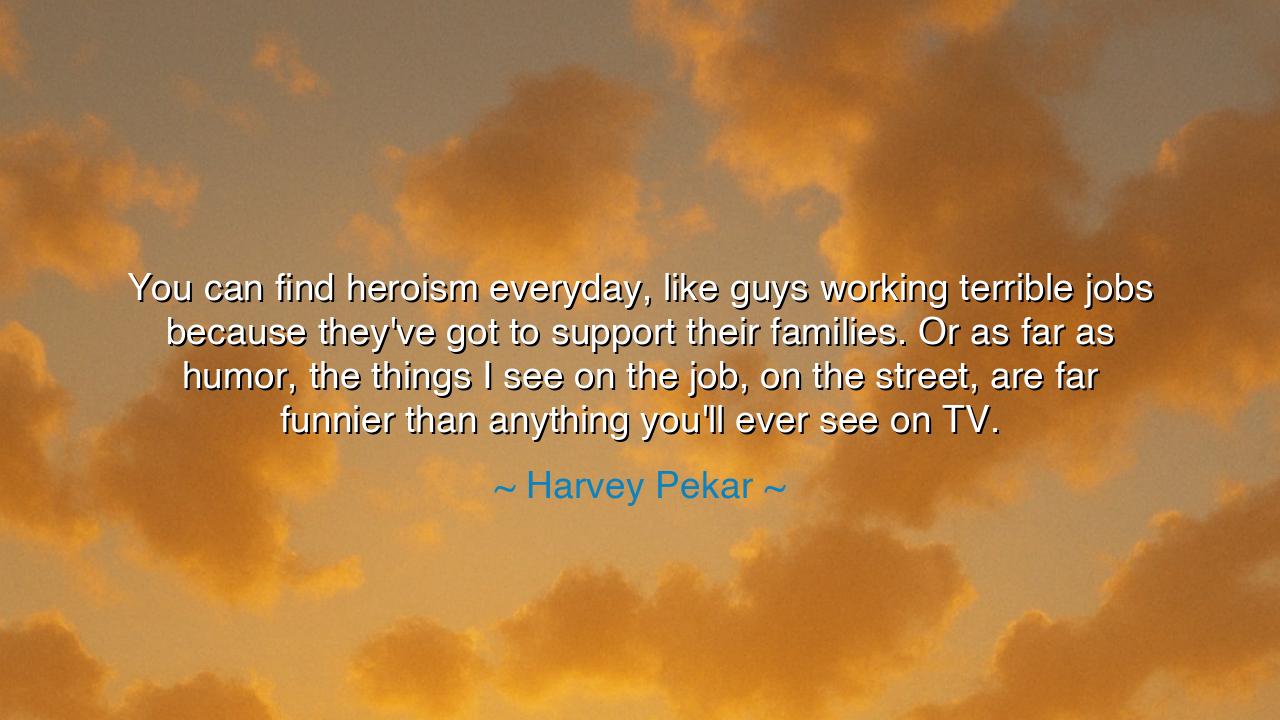
You can find heroism everyday, like guys working terrible jobs
You can find heroism everyday, like guys working terrible jobs because they've got to support their families. Or as far as humor, the things I see on the job, on the street, are far funnier than anything you'll ever see on TV.






"You can find heroism every day, like guys working terrible jobs because they've got to support their families. Or as far as humor, the things I see on the job, on the street, are far funnier than anything you'll ever see on TV." These powerful words, spoken by Harvey Pekar, speak to a deep and often overlooked truth about the nature of heroism and humor. In a world that often elevates grand gestures and dramatic feats, Pekar reminds us that true heroism can be found in the ordinary, in the quiet struggles of everyday life. Similarly, humor is not always found in the polished performances of television but in the raw, unfiltered moments of life—where the absurdities of the human condition unfold before us. This wisdom, passed down through the ages, calls us to recognize the sacredness in the simple acts of survival and the joy in the most unexpected places.
In the ancient world, the heroes celebrated in myth were not always those who conquered gods or kingdoms. The true heroism lay in the enduring struggles of those who persevered through adversity, not for glory, but out of necessity. Homer's Odyssey gives us the tale of Odysseus, whose true greatness lies not just in his victories, but in his resilience through hardship. He faced storms, temptations, and monsters, but he remained committed to returning home to his family. This kind of quiet heroism, the kind that carries people through the everyday battles of life, is exactly what Pekar refers to: those who work in difficult conditions, who wake up each day to serve their families, are as heroic as any legendary figure from myth. Their struggle, though unseen, carries with it the weight of sacrifice and dedication.
Similarly, the great philosopher Marcus Aurelius, in his writings, often spoke of the power found in the ordinary. In his Meditations, he reminds us that true strength lies in accepting the challenges of everyday life and finding meaning in them. He observed that while the great deeds of history may inspire us, it is the everyday acts of virtue and perseverance that truly shape the course of a man’s life. The workers and laborers who endure the weight of their tasks without fanfare—those are the quiet heroes that build the foundation of society. Pekar’s recognition of these everyday struggles as heroic echoes this ancient wisdom. To find heroism in the daily grind is to understand that greatness does not always come with accolades, but in the simple, relentless pursuit of doing what must be done.
But Pekar’s quote also speaks to the power of humor—a humor that arises not from the scripted, polished entertainment of television but from the real world. True humor, as Aristotle noted, is a reflection of life’s absurdities—the contradictions, the imperfections, and the unexpected moments that occur when people interact with the world in all its unpredictability. Pekar, through his observations of everyday life, found the absurd in the mundane. His words suggest that the moments of humor we experience on the street or in our workplaces are often more authentic, more relatable, than the exaggerated comedy we see on the screen. This is the humor that resonates because it reflects the true nature of life—imperfect, messy, and yet, so often, funny in its unpredictability.
Consider the example of Charlie Chaplin, who, through his character of the Tramp, brought humor to the very struggles of the working class. His films, though comedic, often highlighted the pain, frustration, and absurdity of everyday life. Yet, in the midst of hardship, Chaplin’s humor was not about mocking the poor or the downtrodden—it was about finding joy in the most difficult circumstances. Chaplin’s genius lay in his ability to find humor in suffering, to show that even in the worst of times, laughter could emerge. This, too, reflects Pekar’s observation: the humor that comes from real life, from the hardship of ordinary existence, is often more genuine and powerful than anything scripted or staged.
The lesson that Pekar imparts is one of profound humility and recognition. True heroism and humor lie not in grand, heroic deeds or perfected performances, but in the ordinary moments of life. Heroism is found in the quiet strength of those who work tirelessly to support their families, in the resilience of the human spirit to endure hardship without seeking recognition. Humor, likewise, is most profound when it captures the absurdities of real life—when it reflects the world as it is, with all its contradictions and imperfections. It is not the polished, rehearsed jokes of the stage that touch us the most, but the spontaneous, raw humor that arises from our shared human experience.
So, dear listener, I urge you to recognize the heroism and humor in your own life. Honor the quiet strength of those who work tirelessly, day after day, without seeking praise. Recognize the joy in the everyday struggles, the humor that can be found in the most mundane of tasks. Let your life be a reflection of the ancient wisdom that heroism and humor are not to be found only in grand gestures, but in the small, unseen moments of perseverance and laughter. In this way, you will find the true depth of life—not in spectacle, but in the authentic, unadorned experiences that shape our humanity.






AAdministratorAdministrator
Welcome, honored guests. Please leave a comment, we will respond soon